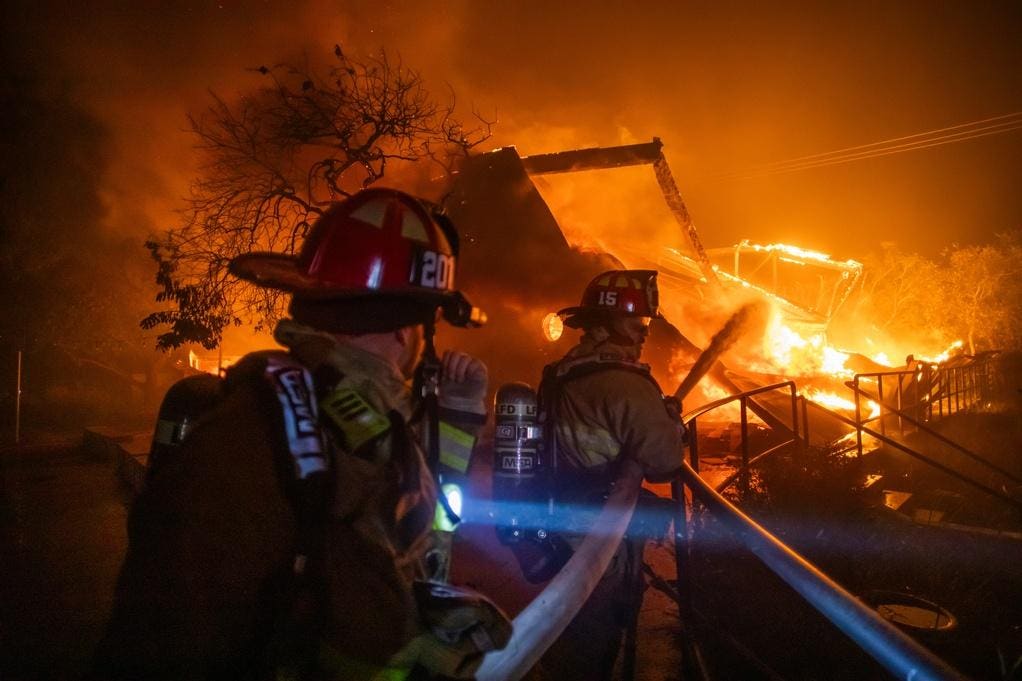LOS ANGELES, CALIFORNIA – JANUARY 8: Firefighters fight the flames from the Palisades Fire burning … [+]
Natural disasters such as hurricanes, earthquakes and the ongoing wildfires in California have become common occurrences. The California Wildfires which began on January 7th have displaced close to 200,000 people and already caused damage of at least 135 billion dollars MarketWatch reported.
These natural disasters can bring out the best in people who want to donate to charities to help the victims. However, unfortunately they also can bring out the worst in scammers who are quick to take advantage of the generosity of people by contacting them posing as charities. Instead of collecting funds to help the victims of these natural disasters, these scam artists steal the money for themselves.
Charities are not subject to the federal Do Not Call List. So even if you are signed up for the federal Do Not Call List, legitimate charities are able to contact you by phone. The problem is that whenever you get a phone call, you can never be sure as to who is really calling you so you. So, you may be contacted either by a fake charity or a scammer posing as a legitimate charity.
Using a technique called spoofing, scammers can manipulate your Caller ID to make it appear that the call is coming from a legitimate charity when it is not. Similarly, when you are solicited for a charitable contribution by email, social media or text message you cannot be sure as to whether the person contacting you is legitimate or not.
Scammers use AI to make their scams more believable. They can harvest social media data to create more convincing spear phishing emails and text messages as well as create legitimate appearing phony charity websites. We can also expect scammers to use AI deepfake technology and voice cloning to create charitable solicitations that appear to come from trusted public officials or celebrities.
Scammers posing as legitimate charities also use social media to lure people into contributing to their phony charities. The social media posts can be expected to contain AI created videos intended to create emotional appeal.
How To Be Sure You Are Not Being Scammed?
Trust me, you can’t trust anyone. Whenever you get a phone call, a text message or email, you can never be sure who is actually contacting you and the content of the communication is accurate. Never provide credit card information over the phone to anyone whom you have not called or in response to an email or text message unless you have absolutely confirmed that the communication was legitimate.
Before you give to any charity, you may wish to check out the charity with Charity Navigator so you can learn whether or not the charity itself is a scam. Charity Navigator will not only tell you if the charity you are considering is legitimate, but it will also tell you where you can make your donation, thereby avoiding scammers posing as legitimate charities. Additionally, charitynavigator will also tell you how much of the money that any legitimate charity you are considering collects actually goes toward its charitable purposes and how much it uses for fund raising and administrative costs. As a rule of thumb, you may wish to avoid charities that take more than 25% of their donations for their own administrative costs.
Here are Charity Navigator’s picks for the best places to donate and help the victims of the California wildfires.
Scammers Posing As FEMA Officials
Unfortunately, scammers don’t limit their scams related to natural disasters to targeting people wishing to make charitable donations. They also target the victims of the wildfires and other natural disasters by posing as FEMA officials offering financial assistance in return for fees or asking for a payment to help complete necessary paperwork. In 2018 following wildfires in California, FEMA issued a warning to victims of the wildfires to be wary of scammers posing as FEMA officials asking for payments for disaster assistance or help filling out applications.
As we all watch the plight of the victims of the California wildfires, with both horror and compassion we can definitely help by making donations to charities that will provide needed assistance. The key is to make sure we do it wisely and avoid being scammed.
